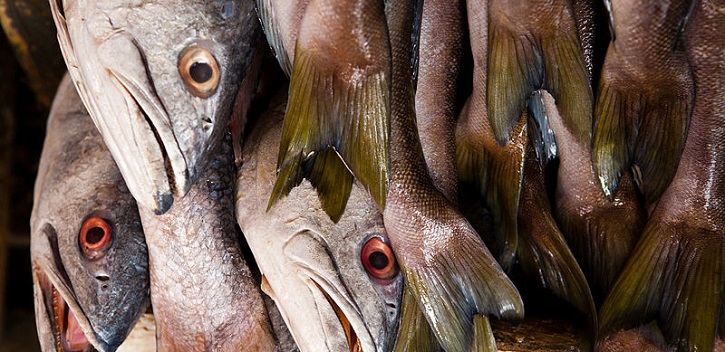Mother's diet can improve gut of baby

Mothers who eat healthy fats from oily fish may help their children form healthy guts and maintain healthy weights throughout their lives.
SFI Research Centre, APC Microbiome Ireland, together with Massachusetts General Hospital and Harvard University found a mother with more omega-3 fat in her body may produce children with healthy guts https://t.co/kkfBylkNFs #BelieveInScience pic.twitter.com/bVxdfbkfHi
— SFI (@scienceirel) May 30, 2018
The new research from the Science Foundation Ireland Research Centre APC Microbiome Ireland at Teagasc and University College Cork, together with collaborators at Massachusetts General Hospital/Harvard University, shows that, in laboratory mice, babies gained less weight on a high-fat diet if they were born to a mother who had more healthy fats called omega-3s in her body. The mice also gained less weight if they breastfed from a mother with more omega-3 fats. Interestingly, this only occurred in male babies; the mother’s fats had no effect on weight in female babies.
The modern Western diet is deficient in healthy omega-3 fats, which are found in oily fish, nuts and seeds. Humans can't produce these fats in their body and need to get them from their diet. Instead, the Western diet is overloaded with less healthy omega-6 fats, which are found in vegetable oils and fried foods such as chips and crisps. This imbalance in dietary fats may contribute to obesity, heart disease and other chronic diseases. But prior to this study, little was known about how mothers’ omega-3/omega-6 ratios affect their children’s health.
In this study, the balance of omega-3 and omega-6 fats in the mother’s body was also found to affect the health of her pups’ guts. If a mother had more omega-6 fats in her body during pregnancy or breastfeeding, her pups’ guts were more ‘leaky’, which led to inflammation in their blood. These babies also had more unhealthy bacteria in their intestines, which may have contributed to their weight gain. However, if these pups were breastfed by a mother with a more healthy ratio of omega-3: omega-6 fats, their guts were healthier and had more healthy bacteria. Interestingly, the effect of mother’s fat on her babies gut health continued throughout their life until they were adults.
Commenting on the study, Dr. Ruairi Robertson, the lead author, said: “We have shown that a mother’s diet during pregnancy and breastfeeding may affect her babies’ weight and gut health in the long term. Furthermore, we know that your gut bacteria are extremely important for your overall health, particularly to maintain a healthy weight and gut. These results suggest that if a mother eats more healthy fats and less unhealthy fats during pregnancy and breastfeeding, she may be able to help the right types of microbes grow in her baby’s intestines and form a healthy gut for later life”.
Prof Jing Kang at Massachusetts General Hospital and Harvard University added "our study, using unique transgenic mouse models, has produced reliable data suggests two important things: 1) a balanced ratio of omega-6/omega-3 fats in a mother's body during pregnancy and breastfeeding is critical for reducing risk of obesity in her children over lifetime, and 2) microbes in her baby’s gut is a key player in mediating this effect."
Previously there have been concerns over pregnant women eating too much fish due to the potential dangers of mercury. However, this is only a concern for certain types of fish, particularly predatory fish such as shark, swordfish and certain types of tuna. Current recommendations suggest that everyone, including pregnant women, eat 2 portions of oily fish (mackerel, salmon, sardines, trout, herring) per week. “The benefits of omega-3s from oily fish far outweigh the risks of mercury, if kept to 2-3 portions per week,” says Prof Catherine Stanton, Principal Investigator at Teagasc and APC Microbiome Ireland. “However, most important is the balance of fats. Aim to get enough omega-3s from oily fish, nuts and seeds whilst at the same time reducing omega-6 intake from vegetable oils and fried foods”.
This research is published in the journal Microbiome and was funded through a Teagasc Walsh Fellowship, and Fulbright Scholarship from the Fulbright Commission of Ireland to Ruairi Robertson and by Science Foundation Ireland through a Centre grant to APC Microbiome Ireland. Prof Kang is supported in part by Fortune Education Foundation and Sansun Life Sciences.
Original reference:
Maternal omega-3 fatty acids regulate offspring obesity through persistent modulation of gut microbiota Ruairi C. Robertson, Kanakaraju Kaliannan, Conall R.Strain, R. Paul Ross, Catherine Stanton and Jing X. Kang (2018) Microbiome 6: 95
https://microbiomejournal.biomedcentral.com/articles/10.1186/s40168-018-0476-6
For more on this story contact:
Dr Catherine Buckley. Communications and Outreach Manager, APC Microbiome Ireland, University College Cork. tel +353 21 4903362; mobile +353 86 8554744; email: c.buckley@ucc.ie OR Dr Ruairi Robertson, lead author. Mobile: +44 742 836 8527; email: ruairi.robertson@gmail.com
